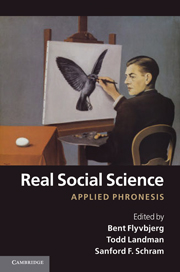Book contents
- Frontmatter
- Contents
- Figures
- Tables
- Contributors
- Acknowledgements
- 1 Introduction: new directions in social science
- Part I Theory and method
- 2 Phronetic social science: an idea whose time has come
- 3 Phronesis and narrative analysis
- 4 The feel for power games: everyday phronesis and social theory
- 5 Phronesis, projects and power research
- Part II Applied phronesis
- 6 Why mass media matter and how to work with them: phronesis and megaprojects
- 7 Power and conflict in collaborative research
- 8 Unsettling a settler society: film, phronesis and collaborative planning in small-town Canada
- 9 Phronesis and critical policy analysis: Heathrow's ‘third runway’ and the politics of sustainable aviation in the United Kingdom
- 10 Amnesty in the age of accountability: Brazil in comparative context
- 11 Feminist phronesis and technologies of citizenship
- 12 Making the teaching of social justice matter
- 13 Spatial phronesis: a case study in geosurveillance
- 14 Important next steps in phronetic social science
- Index
- References
12 - Making the teaching of social justice matter
Published online by Cambridge University Press: 05 June 2012
- Frontmatter
- Contents
- Figures
- Tables
- Contributors
- Acknowledgements
- 1 Introduction: new directions in social science
- Part I Theory and method
- 2 Phronetic social science: an idea whose time has come
- 3 Phronesis and narrative analysis
- 4 The feel for power games: everyday phronesis and social theory
- 5 Phronesis, projects and power research
- Part II Applied phronesis
- 6 Why mass media matter and how to work with them: phronesis and megaprojects
- 7 Power and conflict in collaborative research
- 8 Unsettling a settler society: film, phronesis and collaborative planning in small-town Canada
- 9 Phronesis and critical policy analysis: Heathrow's ‘third runway’ and the politics of sustainable aviation in the United Kingdom
- 10 Amnesty in the age of accountability: Brazil in comparative context
- 11 Feminist phronesis and technologies of citizenship
- 12 Making the teaching of social justice matter
- 13 Spatial phronesis: a case study in geosurveillance
- 14 Important next steps in phronetic social science
- Index
- References
Summary
In Making Social Science Matter, Bent Flyvbjerg deconstructs the dominant hierarchy that privileges the natural sciences over the social sciences by offering a third way out of the ‘science wars’ debate; one that carves out a significant place for both the natural sciences and the social sciences. As he writes, ‘where natural science is weak, social science is strong and vice versa’ (2001: 53). Social science, Flyvbjerg argues, should be recast based largely upon Aristotle's conception of phronesis or practical wisdom mixed with a healthy dose of Foucault's understanding of power. This reinvigorated social science trumps natural science in the understanding of social phenomena by emphasizing contexts, interpretations and an in-depth understanding of existing power relations. In short, it is ‘an intellectual activity aimed at…contributing to social and political praxis’ (2001: 4). His call for a phronetic social science is a useful antidote to the hegemonic position of formal modelling and other positivistic approaches that had come to dominate the social sciences, especially American political science. Of course, much, if not all, of social science, including the formal modelling that has dominated the American Political Science Review, claims to be ‘contributing to social and political praxis’ (2001: 4). Flyvbjerg though harkens back to Aristotle to show the necessity of an in-depth understanding of context and the ability to make political judgements within these contexts. What is not as clear is the extent to which Flyvbjerg is calling on social scientists to get involved and do politics in lieu of merely studying politics. For Aristotle, phronetics as an intellectual virtue was not gained by stepping back and contemplating reality from an objective distance, as if that was possible, but it came from getting one's hands dirty by actively confronting the problems of the day. To what extent is Flyvbjerg urging social scientists to be social and political beings, to strive to be, in Bourdieu's terms, virtuoso social actors?
Information
- Type
- Chapter
- Information
- Real Social ScienceApplied Phronesis, pp. 246 - 263Publisher: Cambridge University PressPrint publication year: 2012
References
Accessibility standard: Unknown
- 2
- Cited by
